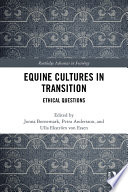
Equine Cultures in Transition : Ethical Questions PDF
260 Pages·2019·1.4302 MB·other
Most books are stored in the elastic cloud where traffic is expensive. For this reason, we have a limit on daily download.
Preview Equine Cultures in Transition : Ethical Questions
Description:
Societal views on animals are rapidly changing and have become more diversified: can we use them for our own pleasure, and how should we understand animal agency? These questions, asked both in theoretical discourses and different practices, are also relevant for our understanding of horses and the human–horse relation. Equine Cultures in Transition stands as the first volume to bring together ethical questions of the new field of human–horse studies. For instance: what sort of ethics should be developed in relation to the horse today: an egalitarian ethics or an ethics that builds upon asymmetrical relations? How can we understand the horse as a social actor and as someone who, just like the human being, becomes through interspecies relations? Through which methods can we give the horse a stronger voice and better understand its becoming? These questions are not addressed from a medical or ethological perspective focused on natural behaviour, but rather from human acknowledgement of the horse as a sensing, feeling, acting, and relational being; and as a part of interspecies societies and relations. Providing an introductory yet theoretically advanced and broad view of the field of post humanism and human animal studies, Equine Cultures in Transition will appeal to students and researchers interested in fields such as human–animal studies, political sociology, animals and ethics, animal behaviour, anthropology, and sociology of culture. It may also appeal to riders and other practitioners within different horse traditions.
See more
The list of books you might like
Most books are stored in the elastic cloud where traffic is expensive. For this reason, we have a limit on daily download.
